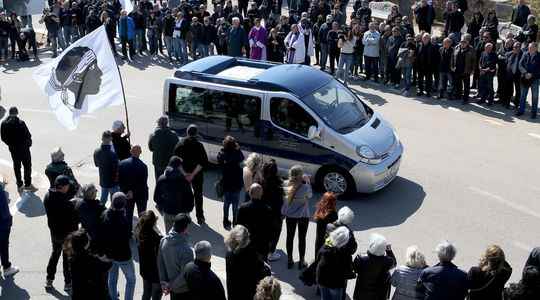In a few weeks, Corsica has become a powder keg. A press release from the FLNC, a dormant clandestine organization, published in the middle of a visit by Gérald Darmanin on March 16, came to galvanize a little more a youth, some of whom were fed with stories of the armed struggle. Law enforcement is on the alert, although according to a police source, “there is little risk that the organization will activate in its initial form, if only because the young people have not the training of artificer while the old ones had made the war of Algeria, at least the military service”. But if we doubt their ability to chain blue nights, the determination of young activists is undeniable. The slightest provocation, such as a video attributed to CRS who allegedly sang The Marseillaise at the Furiani barracks, at the very moment of the burial of Yvan Colonna, broadcast this Saturday March 26 on social networks, is a conflagration factor. This Sunday, March 27 at the end of the day, clashes opposed the police to several hundred demonstrators in front of the barracks of Asprettu, in Ajaccio.
Wednesday, March 23, already, the remains of Yvan Colonna had landed on the tarmac of Ajaccio in an almost mystical atmosphere that the red smoke and the silence of the crowd amplified. The next day, the decision to lower all the flags hung on the pediment of the headquarters of the Corsica community scandalized the opinion leaders and elected officials of the Republic on the continent. “It’s an inappropriate gesture and a fault”, commented cautiously Emmanuel Macron, “an insult”, for Gérald Darmanin.
Black crepe, symbol of mourning
In Corsica, the island is in mourning, the emotion is immense, the sadness is commensurate with the indignation aroused by the tragic end of Yvan Colonna. This act did not arouse any real debate the day before the burial of the man who has become the symbol of the injustice done to the Corsican people. Many mayors, such as Laurent Marcangeli in Ajaccio (right, Horizons), Jean-Charles Orsucci in Bonifacio (LREM, left tendency), or Paul-Marie Bartoli in Propriano (various left) simply did not follow the movement while taking care to make their point of view known in an overly tense climate. “It’s nonsense, it hadn’t happened when Edmond Simeoni, the father of Corsican nationalism died!”, Only breathes an elected official. Others, like Pierre Savelli, the autonomist mayor (Femu a Corsica) of Bastia, stronghold of the president of the executive Gilles Simeoni, or even Jean-Christophe Angelini, leader of the Partitu di a Nazione Corsa-PNC (autonomist), in Porto-Vecchio, have opted for the black crepe, symbol of mourning, only on the flag with the Moor’s head.
For a month and the aggression of Yvan Colonna, the island has rediscovered itself misunderstood, identity, Latin and fundamentally different from a multicultural France. Seen from the continent, the Colonna affair is about riots, after the aggression of a man who in a few days went from the status of assassin of the prefect Erignac to that of hero of the Corsican people. Demonstrations followed by a promise of autonomy obtained under the threat of a region, a spoiled and ungrateful child of the Republic. Vue de Corse is the assassination, more than twenty years after his incarceration in the prison of Arles, of a son of Cargèse, to a respected family and whose guilt remains subject to questioning in many minds. It is also the bankruptcy of a government which has not considered the repeated demands of elected nationalists who have come to power for six years, namely the bringing together of political prisoners, the co-official status of the language and full and complete autonomy. . In 2022, the nationalist lists won 70% of the votes cast in the territorial elections.
For Arnaud Benedetti, associate professor at the University of Paris-Sorbonne and editor-in-chief of the political and parliamentary review, the cultural gap between Paris and Corsica will never have appeared as wide as through the diametrically opposed perceptions of the end tragedy of Yvan Colonna: “There is the impression in Corsica that the social body has been attacked. The fundamental difference between the individualistic French society, quite atomized and the Corsican society is that the latter still functions very strong collective schemes, family and village solidarity. There is a cultural, anthropological phenomenon which explains a very different vision and a widening gap”.
“Unbearable colonization”
On the island, the anger of young people directed against the “murderous state” has exacerbated the anti-French sentiment that has resurfaced in recent months, due to land pressure from the increase in second homes and urbanization. . “An unbearable colonization”, vilify the young activists. According to island observers, the tension is stronger than that known in the 1990s, during the fratricidal war between underground factions.
This tension is maintained by the internal divisions in the nationalist political family, pushing the moderate and majority party of Gilles Simeoni (Femu a Corsica) to give pledges to a militant base disappointed with its results and which wants to influence the debates. These pledges cross the ridge line that separates autonomy from independence, to the chagrin of many Corsicans, including former historic activists, who, if they claim autonomy with resident status to fight against speculation on an island where 20% of the population lives below the poverty line, do not want to hear about independence.
“In Corsica, we are getting expensive with this whole story. And me, my heroes, are those of the resistance, Fred Scamaroni and Jean Nicoli”, explains anonymously an elected official who fears that, in such a context, the conditions for a peaceful democratic debate are no longer met. “The Corsican malaise”, “this ancient evil”, presented in 1989 by Michel Rocard then Prime Minister, is far from being resolved.
